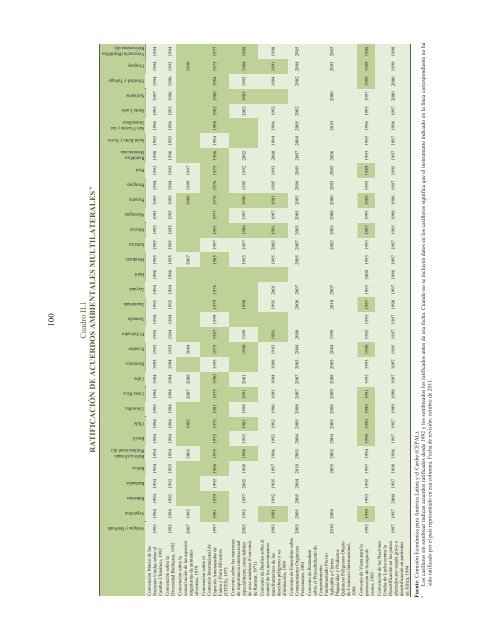La sostenibilidad del desarrollo a 20 años de la cumbre para la tierra: avances, brechas y lineamientos estratégicos para América Latina y el Caribe
En diciembre de 2009 la Asamblea General aprobó la resolución 64/236, en virtud de la cual decidió organizar la Conferencia de las Naciones Unidas sobre el Desarrollo Sostenible. Esta Conferencia se realizará en Río de Janeiro (Brasil) en junio de 2012, 20 años después de la Conferencia de las Naciones Unidas sobre el Medio Ambiente y el Desarrollo, conocida como Cumbre para la Tierra, y constituye una oportunidad histórica para hacer un balance de lo sucedido en estas dos décadas, evaluar los advances logrados y las dificultades encontradas y explorar nuevas formas de cooperación que permitan acelerar la transición hacia un desarrollo sostenible.
En diciembre de 2009 la Asamblea General aprobó la resolución 64/236, en virtud de la cual decidió organizar la Conferencia de las Naciones Unidas sobre el Desarrollo Sostenible. Esta Conferencia se realizará en Río de Janeiro (Brasil) en junio de 2012, 20 años después de la Conferencia de las Naciones Unidas sobre el Medio Ambiente y el Desarrollo, conocida como Cumbre para la Tierra, y constituye una oportunidad histórica para hacer un balance de lo sucedido en estas dos décadas, evaluar los advances logrados y las dificultades encontradas y explorar nuevas formas de cooperación que permitan acelerar la transición hacia un desarrollo sostenible.
You also want an ePaper? Increase the reach of your titles
YUMPU automatically turns print PDFs into web optimized ePapers that Google loves.
100<br />
Cuadro II.1<br />
RATIFICACIÓN DE ACUERDOS AMBIENTALES MULTILATERALES a<br />
Antigua y Barbuda<br />
Argentina<br />
Bahamas<br />
Barbados<br />
B<strong>el</strong>ice<br />
Bolivia (Estado<br />
Plurinacional <strong>de</strong>)<br />
Brasil<br />
Chile<br />
Colombia<br />
Costa Rica<br />
Cuba<br />
Dominica<br />
Ecuador<br />
El Salvador<br />
Granada<br />
Guatema<strong>la</strong><br />
Guyana<br />
Haití<br />
Honduras<br />
Jamaica<br />
México<br />
Nicaragua<br />
Panamá<br />
Paraguay<br />
Perú<br />
República<br />
Dominicana<br />
Saint Kitts y Nevis<br />
San Vicente y <strong>la</strong>s<br />
Granadinas<br />
Santa Lucía<br />
Suriname<br />
Trinidad y Tabago<br />
Uruguay<br />
Venezue<strong>la</strong> (República<br />
Bolivariana <strong>de</strong>)<br />
Convención Marco <strong>de</strong> <strong>la</strong>s<br />
Naciones Unidas sobre <strong>el</strong><br />
Cambio Climático, 1992<br />
Convención sobre <strong>la</strong><br />
Diversidad Biológica, 1992<br />
Convención sobre <strong>la</strong><br />
conservación <strong>de</strong> <strong>la</strong>s especies<br />
migratorias <strong>de</strong> animales<br />
silvestres, 1979<br />
Convención sobre <strong>el</strong><br />
Comercio Internacional <strong>de</strong><br />
Especies Amenazadas <strong>de</strong><br />
Fauna y Flora Silvestres<br />
(CITES), 1973<br />
Convenio sobre <strong>la</strong>s marismas<br />
<strong>de</strong> importancia internacional<br />
especialmente como hábitat<br />
<strong>de</strong> aves acuáticas (Convenio<br />
<strong>de</strong> Ramsar, 1971)<br />
Convenio <strong>de</strong> Basilea sobre <strong>el</strong><br />
control <strong>de</strong> los movimientos<br />
transfronterizos <strong>de</strong> los<br />
<strong>de</strong>sechos p<strong>el</strong>igroso y su<br />
<strong>el</strong>iminación, 1989<br />
Convenio <strong>de</strong> Estocolmo sobre<br />
Contaminantes Orgánicos<br />
Persistentes, <strong>20</strong>01<br />
Convenio <strong>de</strong> Rotterdam<br />
sobre <strong>el</strong> Procedimiento <strong>de</strong><br />
Consentimiento<br />
Fundamentado Previo<br />
Aplicable a Ciertos<br />
P<strong>la</strong>guicidas y Productos<br />
Químicos P<strong>el</strong>igrosos Objeto<br />
<strong>de</strong> Comercio Internacional,<br />
1998<br />
Convenio <strong>de</strong> Viena <strong>para</strong> <strong>la</strong><br />
protección <strong>de</strong> <strong>la</strong> capa <strong>de</strong><br />
ozono, 1985<br />
Convención <strong>de</strong> <strong>la</strong>s Naciones<br />
Unidas <strong>de</strong> Lucha contra <strong>la</strong><br />
Desertificación en los países<br />
afectados por sequía grave o<br />
<strong>de</strong>sertificación en particu<strong>la</strong>r<br />
en África, 1994<br />
1993 1994 1994 1994 1994 1994 1994 1994 1995 1994 1994 1993 1993 1995 1994 1995 1994 1996 1995 1995 1993 1995 1995 1994 1993 1998 1993 1996 1993 1997 1994 1994 1994<br />
1993 1994 1993 1993 1993 1994 1994 1994 1994 1994 1994 1994 1993 1994 1994 1995 1994 1996 1995 1995 1993 1995 1995 1994 1993 1996 1993 1996 1993 1996 1996 1993 1994<br />
<strong>20</strong>07 1992 <strong>20</strong>03 1983 <strong>20</strong>07 <strong>20</strong>08 <strong>20</strong>04 <strong>20</strong>07 1989 1999 1997 1990<br />
1997 1981 1979 1992 1986 1979 1975 1975 1981 1975 1990 1995 1975 1987 1999 1979 1976 1985 1997 1991 1977 1978 1976 1975 1986 1994 1988 1982 1980 1984 1975 1977<br />
<strong>20</strong>05 1992 1997 <strong>20</strong>05 1998 1990 1993 1981 1998 1991 <strong>20</strong>01 1990 1999 1990 1993 1997 1986 1997 1990 1995 1992 <strong>20</strong>02 <strong>20</strong>02 1985 1992 1984 1988<br />
1993 1991 1992 1995 1997 1996 1992 1992 1996 1995 1994 1998 1993 1991 1995 <strong>20</strong>01 1995 <strong>20</strong>03 1991 1997 1991 1995 1993 <strong>20</strong>00 1994 1996 1993 1994 1991 1998<br />
<strong>20</strong>03 <strong>20</strong>05 <strong>20</strong>05 <strong>20</strong>04 <strong>20</strong>10 <strong>20</strong>03 <strong>20</strong>04 <strong>20</strong>05 <strong>20</strong>08 <strong>20</strong>07 <strong>20</strong>07 <strong>20</strong>03 <strong>20</strong>04 <strong>20</strong>08 <strong>20</strong>08 <strong>20</strong>07 <strong>20</strong>05 <strong>20</strong>07 <strong>20</strong>03 <strong>20</strong>05 <strong>20</strong>03 <strong>20</strong>04 <strong>20</strong>05 <strong>20</strong>07 <strong>20</strong>04 <strong>20</strong>05 <strong>20</strong>02 <strong>20</strong>02 <strong>20</strong>04 <strong>20</strong>05<br />
<strong>20</strong>10 <strong>20</strong>04 <strong>20</strong>05 <strong>20</strong>03 <strong>20</strong>04 <strong>20</strong>05 <strong>20</strong>08 <strong>20</strong>09 <strong>20</strong>08 <strong>20</strong>05 <strong>20</strong>04 1999 <strong>20</strong>10 <strong>20</strong>07 <strong>20</strong>02 <strong>20</strong>05 <strong>20</strong>08 <strong>20</strong>00 <strong>20</strong>03 <strong>20</strong>05 <strong>20</strong>06 <strong>20</strong>10 <strong>20</strong>00 <strong>20</strong>03 <strong>20</strong>05<br />
1992 1990 1993 1992 1997 1994 1990 1990 1990 1991 1992 1993 1990 1992 1993 1987 1993 <strong>20</strong>00 1993 1993 1987 1993 1989 1992 1989 1993 1992 1996 1993 1997 1989 1989 1988<br />
1997 1997 <strong>20</strong>00 1997 1998 1996 1997 1997 1999 1998 1997 1997 1995 1997 1997 1998 1997 1996 1997 1997 1995 1998 1996 1997 1995 1997 1997 1998 1997 <strong>20</strong>00 <strong>20</strong>00 1999 1998<br />
Fuente: Comisión Económica <strong>para</strong> <strong>América</strong> <strong>La</strong>tina y <strong>el</strong> <strong>Caribe</strong> (CEPAL).<br />
Los casilleros sin sombrear indican acuerdos ratificados <strong>de</strong>s<strong>de</strong> 1992 y los sombreados los ratificados antes <strong>de</strong> esa fecha. Cuando no se incluyen datos en los casilleros significa que <strong>el</strong> instrumento indicado en <strong>la</strong> línea correspondiente no ha<br />
sido ratificado por <strong>el</strong> país representado en esa columna. Fecha <strong>de</strong> revisión: octubre <strong>de</strong> <strong>20</strong>11.<br />
a


















